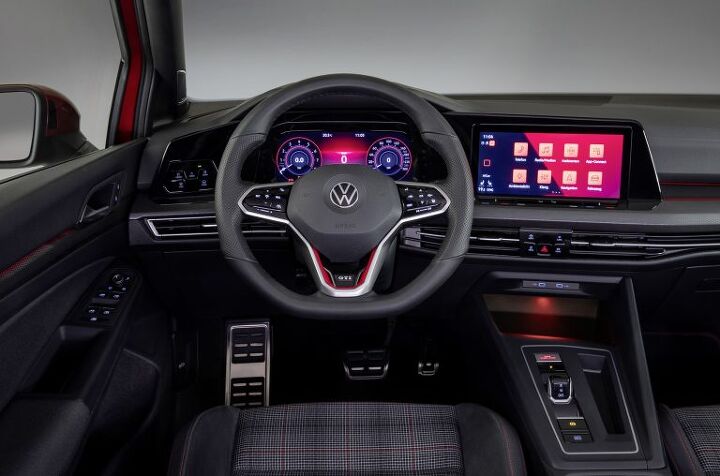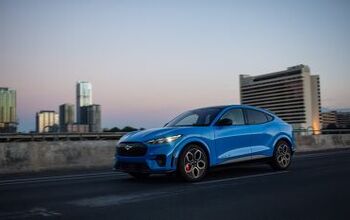Mk8 Golf Deliveries Suspended Over Software Gremlins

We don’t know what’s going on with Volkswagen’s software, but if the automaker doesn’t sort it out quickly, it runs the risk of becoming infamous for it. Technical glitches have plagued the launch of Volkswagen Group’s most recent models; so much so, it’s starting to become a trend.
Obviously, there were “software issues” that allowed VW to circumvent emissions testing before the Dieselgate scandal kicked off in 2015, but few people actually believe that was the result of rogue computer code, rather than a corporate attempt to dodge strengthened environmental regulations.
These new issues appear to be generalized glitches stemming from the company’s jump into vehicular connectivity. With the upcoming ID.3 EV, Volkswagen opted to keep its summer 2020 launch and handle existing software glitches (the car had already entered limited production for first-edition models) with a software fix offered at a later date. Yet the more we learn about it, the worse the overall situation appears. Rumors suggest the ID.3 may have a slower-than-anticipated roll-out, with fewer features than originally advertised.
We’re now learning the same might be true for the Mk8 Golf — another new model experiencing technical glitches. This generation saw the model swap to a digitized interface offering enhanced connectivity, in line with the industry’s push to make cars more modern. Sadly, these changes haven’t panned out ideally for either the automaker or its customers. VW has had to stall deliveries of the new Golf to address another round of software issues.
Having already endured a production delay under vaguely similar circumstances, German outlet Der Spiegel reports that Volkswagen recently confirmed the Golf was discovered to have an issue during some routine quality assurance investigations. These new problems are alleged to stem from software (basically OnStar) that enables automatic emergency calls and GPS tracking following an accident.
‘No biggy,’ we hear you saying. ‘Just disable it.’
Well, things are a little more complicated than that. The European Union has mandated that such features be installed on all automobiles manufactured since 2018. Volkswagen needs to have this system installed and functional by law — and it isn’t cooperating with other systems found in the Mk8, creating all new problems that somehow still seem familiar. Months earlier, VW said it would have to delay production of the car after becoming aware of problems with over-the-air updates and the vehicle’s multimedia interface.
Your author believes the German carmaker already shot itself in the foot by abandoning physical buttons and knobs for touch- and voice-sensitive controls. While the alterations do make the Mk8 Golf’s interior quite handsome, these kinds of changes rarely go over well with the public. They also smack of cost-cutting. Why spend a few cents on a volume knob when you can code for the ubiquitous display to have a touch-sensitive volume slider?
If you don’t care about the user experience, then there is no reason.
One gets the feeling that VW is in for a rude awakening. Honda found out the hard way that a wonky digital interface is incredibly bad for business. When it nixed volume knobs for touchable sliders a few years ago, the world cried bloody murder until Honda swapped back. However, Volkswagen is applying this theory to the Golf’s entire cabin — and it sounds like things haven’t worked out as intended. Features are reportedly having issues interfacing with each other, potentially rendering the car a total drag to live with if they’re not sorted quickly.
Again, this could have been avoided by taking all of those connectivity features the industry is so eager to implement and throwing them directly into the trash. But then they’d never be able to sell you in-app purchases and harvest your personal data, diluting long-term business plans. Frankly, we get the feeling VW prioritized this data-driven business model at the expense of its physical product. Software headaches are now fairly normal for the German manufacturer, yet it seems dead set on pushing the technology through as quickly as it can manage.
Of course, launching a high-volume model in various states of disrepair remains a bad idea. While VW might feel secure in releasing the ID.3 preemptively in need of a software fix, it cannot do this with the Golf. Its problems already place it at odds with European law; meanwhile, the public will not embrace a mainstream model plagued by technical gremlins — especially one that positions its flashy new interior as its crowning achievement.
As such, Volkswagen is storing every Mk8 Golf manufactured thus far. It hopes to have a software fix implemented within the next month, though at this point nothing’s been confirmed. We should also note that VW is far from the only automaker having issues with software. Mercedes-Benz was recently found to have similar coding problems with its emergency call system communication module, as well.
[Images: Volkswagen]

A staunch consumer advocate tracking industry trends and regulation. Before joining TTAC, Matt spent a decade working for marketing and research firms based in NYC. Clients included several of the world’s largest automakers, global tire brands, and aftermarket part suppliers. Dissatisfied with the corporate world and resentful of having to wear suits everyday, he pivoted to writing about cars. Since then, that man has become an ardent supporter of the right-to-repair movement, been interviewed on the auto industry by national radio broadcasts, driven more rental cars than anyone ever should, participated in amateur rallying events, and received the requisite minimum training as sanctioned by the SCCA. Handy with a wrench, Matt grew up surrounded by Detroit auto workers and managed to get a pizza delivery job before he was legally eligible. He later found himself driving box trucks through Manhattan, guaranteeing future sympathy for actual truckers. He continues to conduct research pertaining to the automotive sector as an independent contractor and has since moved back to his native Michigan, closer to where the cars are born. A contrarian, Matt claims to prefer understeer — stating that front and all-wheel drive vehicles cater best to his driving style.
More by Matt Posky
Latest Car Reviews
Read moreLatest Product Reviews
Read moreRecent Comments
- MaintenanceCosts "While there are absolutely exceptions, the days of the super-sleazy used car dealer seem to be behind us here in the States."Citation needed.
- SCE to AUX Sounds like the written-off cars didn't even have enough life in them to survive the short warranties. The scheme would have lasted longer if the cars were sold as-is.Is "written off" similar to an "R" or "S" title in the US?
- AZFelix Not enough charging stations. Long wait times. Do not recommend.
- 2ACL I love the CV6 + stick pairing, even if it's not particularly quick (or efficient) by modern standards. It looks to have a solid foundation and would be nice to drive fully sorted, but Honda/Acuraphiles seem more interested in ressurecting second generation cars. I wanted a manual GS sedan for the longest time, though I'd have gladly taken a first generation manual coupe. Thankfully, we're spared of 'future collectable' pricing with this one.
- Buickman forget 5G, WiFi, microwaves, smart meters, and Bluetooth. (fluoride, chemtrails, clot shots)what does riding on a giant battery with ultra magnetic frequency do to your innards?oh, so an EV works for you not venturing far? YOU'RE NOT USING GAS!THERE'S NO FOOD IN THE DESERT!





































Comments
Join the conversation
Well, we were wondering why VW delayed the GTI's American intro...
Is that the same "shifter" that is in the new 911? Talk about parts harmonization there.